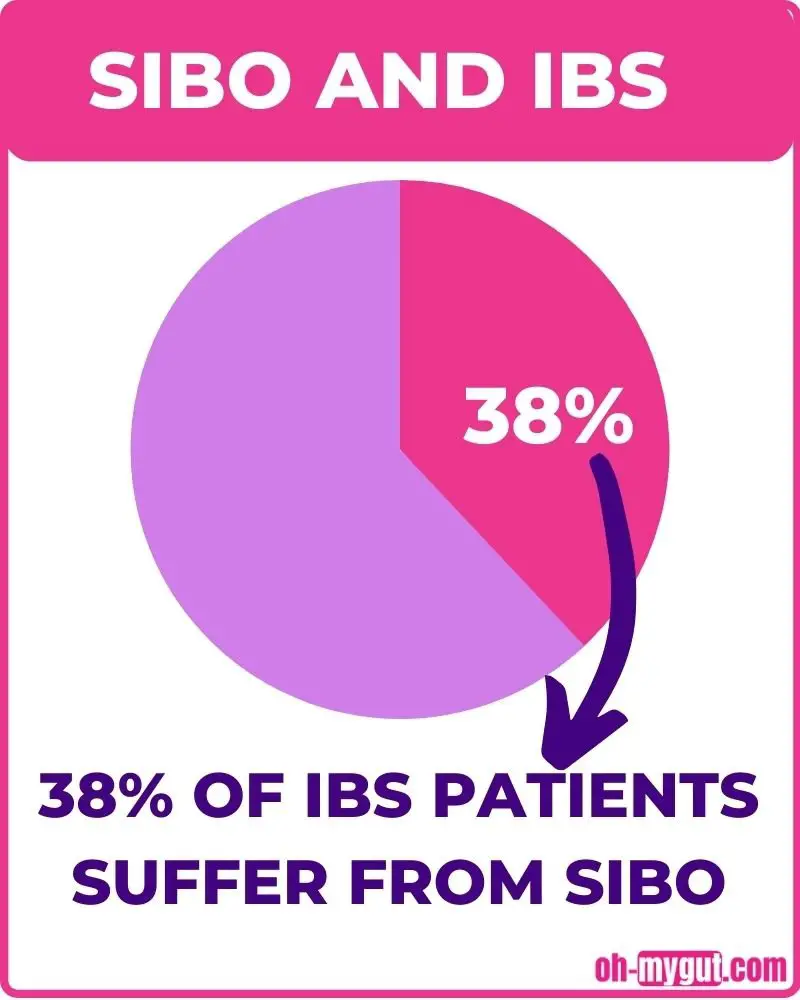Stomach Bloating After Eating Very Little: 10 Causes & When To Worry.
Bloating is a very common symptom. Today, our article is NOT about bloating, but rather the causes of EXTREME bloating.
Severe bloating (even after eating very little food) can be due to functional gastrointestinal diseases such as irritable bowel syndrome and dyspepsia. Also, severe bloating can be due to food intolerances, gastroparesis, or SIBO.
Serious causes such as large abdominal masses, tumors, and intestinal obstruction are rare and have warning signs.
1- Functional dyspepsia.
Functional dyspepsia (also called Indigestion) is a very common condition. About 20% of people worldwide are affected by functional dyspepsia (ref).
Functional dyspepsia affects one out of every five people worldwide. It is one of the most common causes of stomach bloating after eating. That’s why we put it first on this list.
According to the Rome Foundation for Functional GI diseases, Functional dyspepsia is diagnosed by:
A- presence of one or more of the following:
- Bothersome postprandial fullness: feeling bloated even after eating very little.
- Bothersome early satiety: feeling full after eating a small amount of food.
- Bothersome epigastric pain or discomfort.
- Bothersome epigastric burning.
AND
B- No evidence of other structural diseases (such as gastritis, peptic ulcers, or GERD).
You cannot diagnose functional dyspepsia on your own. To diagnose functional dyspepsia, your doctor will exclude any other stomach conditions. He may perform a physical examination, request laboratory tests, and an endoscopy.
Also, your doctor should exclude Helicobacter Pylori stomach infection (an organism that infects the stomach lining, causing stomach ulcers). This can be done by stool or urea breath tests.
Functional dyspepsia is a chronic disease. It has a long course of recurrent symptoms that vary in severity.
Some foods may exacerbate functional dyspepsia, such as:
- Fatty and greasy foods.
- Carbonated drinks.
- Sugar, alcohol, and beer.
- Beans and other gas-producing foods.
Treatment involves medications and modification of your diet and lifestyle. For example:
- Eat smaller, more frequent meals.
- Avoid offending foods (mentioned above).
- Avoid stress and anxiety (mental problems play a major role in functional GI diseases).
- Be physically active.
- Your doctor may prescribe medications such as Proton Pump inhibitors (such as Nexium), Tricyclic antidepressants (such as amitryptiline), or Prokintec medications (such as Metoclopramide).
- In severe cases where stress plays a major role, Your doctor may refer you to a psychotherapist.
MORE:
- Why Do You Have So Much Gas All The Time?
- Constant Indigestion and Gas: 8 Causes Explained.
- Functional Dyspepsia 101: Causes, Symptoms, and Treatment.
2- Postprandial Distress Syndrome (a subtype of functional dyspepsia).
Another possible cause of stomach bloating after eating very little is Postprandial distress syndrome.
The diagnostic criteria for postprandial distress syndrome must include one or bother of the following (for at least three days per week):
- Bothersome postprandial fullness (severe enough to impact your usual activities).
- Bothersome early satiety (severe enough to prevent you from finishing your regular-size meal).
People with postprandial distress syndrome frequently report bloating. Also, symptoms are usually relieved by the evacuation of feces or gas.
Vomiting is not a feature of functional dyspepsia or Postprandial distress syndrome.
Certain foods and drinks are more likely to cause dyspepsia or distress. Commonly fatty foods, spicy foods, beans, and carbonated drinks.
Controlling postprandial distress syndrome usually is the same as functional dyspepsia.
MORE:
3- Other functional gastrointestinal diseases.
Other functional GI diseases can cause bloating to a variable degree. A “functional disease” means doctors cannot detect organ damage or injury.
The most common GI disorders are functional dyspepsia and irritable bowel syndrome (discussed separately).
A long list of functional gastrointestinal disorders exists.
The most common diseases to cause bloating are:
A- Chronic constipaion.
Functional constipation (chronic idiopathic constipation) is a common disease affecting women more than men.
Its cause is unknown; No organic causes could be detected with functional constipation. It is thought to result from the chronic withholding of feces in childhood (ref).
However, this is not the only theory; psychological factors and female hormones may also play a role.
With functional constipation, you may suffer from chronic constipation or hard stools but no remarkable abdominal pain (unlike IBS).
Bloating is common with severe forms of functional constipation. So, if you are already a chronic constipation sufferer, bloating is probably a result.
Learn more about functional constipation HERE.
B- Functional abdominal bloating/distension.
Another less common functional disease of your gut is “Functional abdominal bloating/distension.”
This is an Isolated bloating or distension, not associated with abdominal pain or changes in bowel movements.
Learn More HERE.
C- Functional diarrhea.
Chronic functional diarrhea also can cause bloating and abdominal distension.
Functional diarrhea occurs when there are loose (mushy) or watery stools in at least 75% of stools (in the absence of abdominal pain or other causes of diarrhea) (ref).
4- Irritable bowel syndrome.
IBS is another common and underdiagnosed condition of extreme bloating.
Irritable bowel syndrome is a functional disease characterized by abdominal pain. The abdominal pain is associated with changes in bowel habits or stool form (loose or hard stools).
Although bloating is not a clinical criterion for diagnosing IBS, it is very commonly experienced by IBS patients. This is particularly common among female IBS sufferers (ref).
This study estimates that Bloating with IBS affects about 61.6% of IBS patients. The study found that it is more common in people with IBS diarrhea.
Interestingly, Bloating after eating is associated with depression and catastrophic psychological events in IBS patients.
How to suspect IBS as a cause of Bloating:
According to the Rome Foundation of functional gastrointestinal diseases (ROME IV criteria), IBS is diagnosed by:
- Abdominal pain or discomfort that occurs at least one day per week for the past three months:
- The onset of pain must be associated with 2 of 3 of the below:
1- Associated with Defecation: bowel movements result in relief (or worsening) of the pain.
2- Associated with a change in stool form: stool becomes looser or harder.
3- Associated with a change in stool frequency: AKA diarrhea or constipation.
Bloating with eating very small food is common with IBS patients. Associated bloating with abdominal pain, diarrhea, and constipation is suggestive of IBS.
IBS is a chronic condition with periods of flare-ups and remissions. Psychological stress and food intolerance are the two most commonly linked conditions to IBS.
FODMAPs (Fermentable Oligo-, Di-, Monosaccharides, and polyols) are a group of short-chain carbohydrates and sugars. They are highly fermented, producing gas, bloating, and IBS symptoms.
People with IBS experience marked improvements in their symptoms (including bloating) after cutting FODMAPs from their foods. Learn More.
Learn how to suspect and diagnose IBS in detail HERE.
Learn more about FODMAPs HERE.
5- Gastroparesis (especially with diabetes mellitus).
Gastroparesis is a condition that affects the normal spontaneous movement of your stomach. With gastroparesis, your stomach slows down, resulting in food staying longer inside your stomach.
Slowing down of stomach motility produces symptoms similar to Functional dyspepsia.
Bloating after eating minimal amounts of food is also common with gastroparesis. The difference between gastroparesis and functional dyspepsia is:
- Nausea, abdominal pain is more common with functional dyspepsia than gastroparesis.
- Vomiting is more prevalent with gastroparesis than functional dyspepsia.
Vomiting of undigested food eaten a few hours earlier can occur with gastroparesis. Also, in severe cases, loss of appetite, weight loss, and malnutrition can occur.
The most common cause of gastroparesis is diabetes mellitus. Diabetes may cause damage to the nerves supplying the stomach (vagus nerve).
Other causes and risk factors (ref):
- Abdominal or esophageal surgery.
- Infection, stomach viruses.
- Certain medications, such as pain medications.
- Nervous system diseases such as Parkinson’s disease and multiple sclerosis.
- Hypothyroidism (underactive thyroid).
- Scleroderma (a connective tissue disease).
Learn more about gastroparesis HERE.
6- Lactose intolerance.
Lactose is a sugar that is present in dairy products. Your body produces an enzyme to digest lactose (lactase enzyme). Deficiency of lactase enzyme results in intolerance to lactose ingestion.
Lactose intolerance is one of the most common types of food intolerance. Two main types of lactose intolerance exist:
- Primary lactose intolerance is the most common type caused by lactase deficiency. It affects about 5-17% of Europeans and around 44% of Americans (ref).
- Secondary lactose intolerance: rare, caused by stomach bugs or other gut diseases such as celiac disease.
How to suspect lactose intolerance as a cause of bloating:
- Bloating selectively occurs after ingesting milk or dairy products (even in small amounts).
- Gas and gas pain.
- Diarrhea is related to the ingestion of dairy products.
The severity varies according to the degrees of lactose intolerance.
The bottom line is to notice the relation of bloating to dairy products. If you suspect lactose intolerance, consult your doctor to diagnose the condition.
Limiting dairy and lactose-containing foods lead to a marked improvement in bloating and diarrhea.
Learn more about lactose intolerance.
7- Other types of food intolerance.
Lactose is the most common of a wide spectrum of food intolerances. Other types of foods can cause intolerance symptoms that are similar to lactose intolerance.
Bloating, abdominal pain, and diarrhea are the most common symptoms of food intolerance. Common examples of food intolerance (other than lactose) (ref):
- Fructose intolerance: found in fruits, vegetables, and sweeteners such as honey and high-fructose corn syrup.
- Gluten intolerance in wheat and barley can cause celiac disease or a condition called non-celiac gluten sensitivity.
- Amines: they are produced by bacteria during food storage. It can result in food allergy rather than simple food intolerance.
- FODMAPs: a wide variety of short-chain carbohydrates that affects people with IBS. (Note that both lactose and fructose are included in FODMAPs).
Restricting or cutting the offending food will result in an improvement in bloating and other intolerance symptoms.
Identifying food intolerance and diagnosis could be challenging. You and your doctor can overlook many causes of food intolerance.
Discuss the issue with your doctor if you are unsure about the cause of bloating.
8- SIBO (Small Intestinal Bacterial Overgrowth).
Bloating and distension, even after eating small food amounts, is the most common symptom of SIBO.
SIBO is an overgrowth of the bacteria in your intestine, producing extra gas inside your gut.
SIBO is more common than you expect. Dr. Binrui Chen and his research team analyzed and reviewed data from 50 studies about SIBO. Approximately 38% of IBS patients suffer from SIBO (ref).

SIBO may be the underlying cause of many functional gastrointestinal diseases that present with bloating.
Risk factors for SIBO may include being female, old age, and having IBS-Diarrhea.
9- Acute gastroenteritis.
Is this the first time you to experience sudden extreme bloating? If the answer is yes, think of stomach infection or food poisoning.
The first eight causes of bloating cause “chronic or recurrent” types of bloating. If you recently experienced bloating in the past one or two days, it is better to think of infection.
A stomach virus or any stomach bug can infect your stomach and intestine and cause gastroenteritis.
Gastroenteritis is an inflammation of your stomach and intestine that usually leads to acute abdominal pain, diarrhea, nausea, bloating, or vomiting.
An attack of stomach flu may cause extreme bloating after eating tiny amounts of food. It may progress to nausea or vomiting.
Symptoms of acute gastroenteritis include:
- Diarrhea.
- Nausea, vomiting.
- Abdominal cramps.
- Bloating.
- Anorexia (loss of appetite).
- Muscle aches and headaches.
Stomach viruses (such as norovirus and rotavirus) are common. But other bacterial, protozoal infections and foodborne illnesses (food poisoning) can cause such bloating.
10- Serious causes & warning signs.
The most common cause of bloating is gas. Other rare, usually serious causes of bloating can include:
- A mass or tumor in the stomach (stomach cancer).
- An obstruction in the outlet of your stomach (gastric outlet obstruction).
- A large mass inside the abdomen, common causes include an enlarged spleen (splenomegaly), a Huge ovarian cyst, or a tumor.
- Ascites (as in people with terminal liver diseases).
When to worry:
- Weight loss.
- Severely tender abdomen or extreme abdominal pain.
- Vomiting.
- Blood in stool.
- Fatty diarrhea (steatorrhea).
- Abdominal pain that awakens you at night.
- Unexplained fever.
Related Posts:
- Stomach Pain after Emptying the Bladder: Causes…
- 7 Stomach Cancer Symptoms in Women & When To Worry.
- Phlegm After Eating: 7 Causes & How to…
- Can You Die from Eating Melon with Honey? A Doctor’s Answer.
- 5 Causes of Diarrhea After Eating Fatty Foods & Tips…
- Blood On The Outside Of The Stool: 7 Causes & When To Worry.







